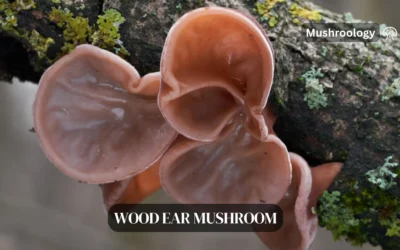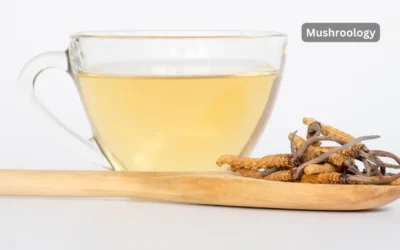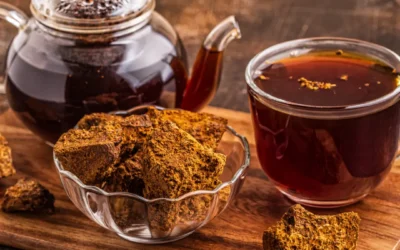For centuries, medicinal mushrooms have been a natural way to support health, and now science is catching up to validate their powerful properties. Let’s take a closer look at 13 superstar mushrooms, their bioactive compounds, and how they can help boost your health. From immune support to better brain function, these fungi offer benefits you don’t want to miss.
| Mushroom | Scientific Name | Key Benefits |
|---|---|---|
| Reishi | Ganoderma lucidum | Stress reduction, immune support, anti-cancer |
| Lion’s Mane | Hericium erinaceus | Cognitive health, memory enhancement, nerve repair |
| Chaga | Inonotus obliquus | Antioxidant-rich, inflammation reduction |
| Cordyceps | Cordyceps sinensis | Energy boost, respiratory health |
| Turkey Tail | Trametes versicolor | Immune support, cancer therapy support |
| Maitake | Grifola frondosa | Blood sugar balance, immune enhancement |
| Shiitake | Lentinula edodes | Cardiovascular health, immune boosting |
| Agaricus Blazei | Agaricus subrufescens | Anti-cancer, immune support |
| Phellinus linteus | Phellinus linteus | Anti-inflammatory, antioxidant |
| Tremella | Tremella fuciformis | Skin hydration, anti-aging |
| Enoki | Flammulina velutipes | Cancer prevention, antioxidant support |
| Blazei Murill | Agaricus brasiliensis | Glucose regulation, immune boosting |
| Polyporus | Polyporus umbellatus | Diuretic, immune enhancement |
1. Reishi mushroom ( Ganoderma lucidum ): benefits, dosage, and research
Reishi mushroom (Ganoderma lucidum), revered in Traditional Chinese Medicine as the “Mushroom of Immortality,” isn’t just ancient folklore. Modern science is now uncovering the potent health benefits of this remarkable fungus. Reishi might be worth considering if you’re looking for natural ways to manage stress, boost your immune system, or explore potential cancer support.
What Makes Reishi So Powerful? The Science Behind the Benefits
Reishi’s power comes from its unique composition of bioactive compounds, including:
- Triterpenes: These compounds are responsible for Reishi’s calming effects. They may influence neurotransmitters, promoting relaxation and potentially improving sleep quality. Think of them as nature’s stress relievers.
- Beta-Glucans: These are potent immune modulators. They “train” your immune cells, like natural killer (NK) cells, to be more effective at fighting off invaders and potentially even cancer cells. This is why Reishi is often touted for its immune-boosting properties.
- Polysaccharides: These complex carbohydrates also contribute to immune support and have shown antioxidant and anti-inflammatory effects in various studies.
Proven health benefits of Reishi: what the research says
- Stress and Anxiety Reduction: Feeling overwhelmed? Reishi might help. Studies suggest it can reduce feelings of anxiety and promote relaxation. While more research is needed, the existing evidence is promising.
- Immune System Support: This is where Reishi truly shines. Research, such as a study by Gao et al. (2002), demonstrated a significant increase (up to 300%) in NK cell activity after Reishi consumption. This means your body’s natural defenses become more efficient.
- Potential Cancer-Fighting Properties: This is a hot area of research. Studies like the one by Wachtel-Galor et al. (2011) indicate Reishi’s potential to inhibit cancer cell growth and induce apoptosis (programmed cell death) in certain cancer types. However, it’s crucial to understand that Reishi is not a cure for cancer, but it may offer supportive benefits.
- Heart and Brain Health: Emerging research suggests Reishi may play a role in cardiovascular health by helping regulate blood pressure and cholesterol. Its antioxidant properties may also protect against age-related cognitive decline.
How to Use Reishi: Dosage and Forms
Getting the right dosage is key. Here’s a general guideline:
- Dried Mushroom: 1.5–9 grams daily. This can be used to make tea.
- Extract: 1–1.5 grams daily. Extracts are more concentrated and often come in capsule or powder form.
Reishi is available in various forms:
- Tea: A traditional way to consume Reishi.
- Capsules: Convenient for precise dosing.
- Tinctures: Liquid extracts that are absorbed quickly.
- Powder: Can be added to smoothies, coffee, or other beverages.
⚠️Important Note: Always consult your healthcare provider before starting any new supplement, especially if you’re pregnant, nursing, taking medications, or have pre-existing health conditions.
2. Lion’s Mane: The Ultimate Natural Brain-Boosting Mushroom
Want to sharpen your focus, boost your memory, and protect your brain as you age? Lion’s Mane (Hericium erinaceus) is making waves in the world of nootropics (cognitive enhancers). This unique-looking mushroom contains powerful compounds that support brain health in remarkable ways. Let’s explore the science-backed benefits and how you can use Lion’s Mane to unlock your brain’s potential.
The Brain-Boosting Power of Hericenones and Erinacines
Lion’s Mane contains two key compounds responsible for its cognitive benefits:
- Hericenones: These stimulate the production of Nerve Growth Factor (NGF) in the brain. NGF is like fertilizer for your brain cells, promoting their growth, maintenance, and survival.
- Erinacines: These compounds can cross the blood-brain barrier, directly impacting brain function and potentially promoting neurogenesis (the creation of new brain cells).
Science-Backed Benefits: What Lion’s Mane Can Do for Your Brain
Here’s what the research says about Lion’s Mane:
- Enhanced Focus and Mental Clarity: By increasing NGF, Lion’s Mane can improve communication between brain cells, leading to sharper focus and clearer thinking.
- Improved Memory and Recall: Studies suggest Lion’s Mane can boost memory and recall, especially in cases of mild cognitive impairment. A 2009 study by Mori et al. showed promising results in this area.
- Neuroprotection and Cognitive Decline: Lion’s Mane’s ability to promote NGF and potentially neurogenesis suggests it could protect against age-related cognitive decline and neurodegenerative diseases like Alzheimer’s. Research by Kawagishi et al. (2008) supports this.
- Potential Mood Support: Some preliminary research indicates Lion’s Mane may also have positive effects on mood and anxiety, although more studies are needed.
How to Use Lion’s Mane: Dosage and Consumption Methods
Here’s a quick guide to dosage:
- Pure Powder: 1–3 grams daily.
- Standardized Extract: 250–750 mg daily. Look for extracts standardized to contain a certain percentage of hericenones and erinacines.
- Premium Supplements: Always follow the label instructions.
You can consume Lion’s Mane in several ways:
- Coffee/Tea: Add powder to your morning beverage.
- Capsules: A convenient and precise way to dose.
- Smoothies: Blend powder into your favorite smoothie.
Important Note: As with any supplement, consult your healthcare provider before starting Lion’s Mane, especially if you have any underlying health conditions or are taking medications.
3. Chaga Mushroom (Inonotus obliquus): The Antioxidant Powerhouse from the North
Chaga (Inonotus obliquus) isn’t your typical mushroom. It’s a hard, charcoal-like growth that primarily thrives on birch trees in cold climates like Siberia, Canada, and Northern Europe. But don’t let its appearance fool you – Chaga is packed with powerful antioxidants and other beneficial compounds that have been used in traditional medicine for centuries. If you’re interested in boosting your antioxidant intake, supporting your immune system, or exploring potential anti-aging benefits, Chaga might be worth exploring.
What Makes Chaga So Special? The Antioxidant Advantage
Chaga’s unique composition is what gives it its potent properties:
- Betulinic Acid: This compound, derived from birch bark, has shown promising anti-inflammatory, antiviral, and even anti-cancer effects in some studies.
- Melanin: Chaga is incredibly rich in melanin, the pigment responsible for skin and hair color. Melanin is a powerful antioxidant that can protect cells from damage caused by free radicals.
- Polysaccharides: These complex carbohydrates support immune function and have demonstrated antioxidant and anti-tumor properties.
Science-Backed Benefits: What Research Reveals About Chaga
Here’s a look at the key benefits supported by scientific research:
- Superior Antioxidant Protection: Chaga is considered one of the most potent natural sources of antioxidants. These compounds neutralize harmful free radicals, which can contribute to aging, inflammation, and various diseases. A 2016 study by Zhao et al. highlighted Chaga’s exceptional free radical scavenging ability.
- Powerful Anti-Inflammatory Effects: Chronic inflammation is linked to many health problems. Chaga’s betulinic acid and other compounds may help reduce inflammation throughout the body.
- Immune System Support: Chaga’s polysaccharides can stimulate the immune system, helping the body defend itself against infections and illnesses.
- Potential Anti-Aging Properties: Due to its high antioxidant content, Chaga may help protect against cellular damage that contributes to ageing. Research by Shashkina et al. (2006) confirmed its unique melanin-based protection.
How to Use Chaga: Dosage and Preparation
Chaga is typically consumed as a tea or extract. Here’s a general guideline:
- Raw Powder: 1–3 grams daily. This can be brewed into a tea.
- Concentrated Extract: 200–600 mg daily. Extracts are more potent and convenient.
Here are the most common ways to consume Chaga:
- Traditional Immunity Tea: Simmering Chaga chunks or powder in hot water for an extended period extracts its beneficial compounds.
- Pre-Workout Energy Boost (Some Users): While not a primary benefit, some people report a mild energy boost from Chaga tea.
- As a Supplement: Chaga extracts are available in capsule and powder form for convenient consumption.
Important Note: While Chaga is generally considered safe, it’s important to consult with your healthcare provider before using it, especially if you are taking blood thinners, have diabetes, or have any other health conditions. Chaga contains compounds that may interact with certain medications.
4. Cordyceps (Cordyceps Sinensis) – The Elite Athlete’s Secret Weapon
This power-packed performance enhancer isn’t just another supplement. With its unique compounds cordycepin and adenosine, Cordyceps naturally supercharges your energy levels and maximizes oxygen utilization. Groundbreaking research by Chen et al. (2010) proved its ability to boost VO2 max in athletes, while Zhou et al. (2015) revealed impressive kidney-protective benefits.
Take 1-3g of powder or 400-800mg of extract daily to experience enhanced stamina and respiratory function. Whether you’re an endurance athlete looking for a natural edge or someone seeking sustained energy, Cordyceps delivers results that could transform your performance. For best results, take it 30 minutes before workouts and maintain consistent daily use.
⚠️ Safety Note: While Cordyceps is generally considered safe, always consult a qualified healthcare provider before starting any new supplement regimen, especially if you’re pregnant, nursing, taking medications, or have underlying health conditions. Some people may experience mild digestive upset or allergic reactions. Start with a lower dose to assess tolerance, and discontinue use if you experience any adverse effects. Choose high-quality supplements from reputable manufacturers, as supplement quality can vary significantly.
Pro tip: Combine with Lion’s Mane for enhanced mental focus during intense training sessions, but discuss any supplement combinations with your healthcare provider first.
5. Turkey Tail (Trametes versicolor) – Your Body’s Natural Defense Booster
Looking to supercharge your immune system naturally? Turkey Tail Mushroom is your answer, backed by decades of clinical research. This powerhouse contains two immune-boosting compounds – PSP and PSK – that have revolutionized complementary cancer care in Asia.
Game-changing research by Tsukagoshi et al. (1984) revealed increased survival rates in cancer patients using PSK, while Yang et al. (1992) demonstrated its impressive antiviral properties. Take 1-3g of powder or 500-1500mg of extract daily via tea, capsules, or powder for optimal immune support.
⚠️ Safety Note: While Turkey Tail has an excellent safety profile, always consult your healthcare provider before starting any new supplement, especially if you’re undergoing cancer treatment, taking medications, or have autoimmune conditions. Choose quality products from reputable manufacturers and start with a lower dose to assess tolerance.
Pro tip: For maximum benefits, combine with Reishi mushroom – but always discuss supplement combinations with your healthcare provider first.
6. Maitake (Grifola frondosa) – The Blood Sugar Balancing Champion
This powerful adaptogenic mushroom does double duty with its unique beta-glucans and D-fraction compounds. Landmark research by Kodama et al. (2002) showed that maitake enhances immune response and supports chemotherapy effectiveness, while Mori et al. (2005) demonstrated its impressive ability to help regulate blood sugar levels.
For optimal benefits, consume 2-7g of maitake dried mushroom or 500-1500mg of extract daily through tea, supplements, or delicious culinary preparations. Perfect for those managing blood sugar levels or seeking immune support. You can also add fresh Maitake to stir-fries and soups for a gourmet nutrition boost.
⚠️ Safety Note: While Maitake is generally safe, those taking diabetes or blood thinners should consult their healthcare provider before use, as it may enhance their effects. Monitor blood sugar levels closely if you’re diabetic. Start with a lower dose and adjust gradually.
Pro tip: Combine with Lion’s Mane for enhanced metabolic and cognitive benefits – but always check with your healthcare provider first, especially if you have diabetes or are taking medications.
7. Shiitake (Lentinula edodes) – The Heart-Health Superfood
The legendary Shiitake mushroom packs two powerful compounds – lentinan and eritadenine – that make it a cardiovascular powerhouse. Breakthrough research by Rathore et al. (2017) confirmed its cholesterol-lowering effects, while Hobbs et al. (2005) demonstrated how its lentinan compound activates immune cell response for enhanced disease resistance.
Enjoy 6-16g fresh/dried or 500-1000mg extract daily. Add these savory mushrooms to stir-fries, soups, and pasta dishes, or take supplements for concentrated benefits. Ideal for anyone looking to support heart health naturally while boosting their immune system.
⚠️ Safety Note: While Shiitake is safe for most people, some may experience skin rashes or digestive discomfort when consuming raw or undercooked mushrooms. Those with autoimmune conditions should consult their healthcare provider before starting supplements. Always source from reputable suppliers and properly cook fresh mushrooms.
Pro tip: For maximum heart benefits, pair with regular exercise and a balanced diet – but discuss any supplement regimen with your healthcare provider, especially if you’re taking cholesterol medications.
8. Agaricus Blazei (Agaricus subrufescens)
Key Compounds
Beta-glucans and ergosterol, known for their strong immune-modulating and anti-cancer properties.
Why It’s Amazing
This mushroom is celebrated for its potential in supporting immunity and combating cancer.
- Study 1: Agaricus Blazei extracts showed significant anti-cancer properties in studies on colon cancer cells (Firenzuoli et al., 2008).
- Study 2: Clinical trials reveal its use in reducing side effects of chemotherapy (Kimura et al., 2004).
How to Use
Commonly consumed as capsules, teas, or powdered forms mixed with beverages.
Daily Dosage
2-5 grams of dried Agaricus or 500-1500 mg of extract daily.
9. Phellinus linteus
Key Compounds
Polysaccharides and hispidin, offering potent antioxidant and anti-inflammatory effects.
Why It’s Amazing
Phellinus linteus is a powerful anti-inflammatory agent and antioxidant. It has been shown to reduce tumor growth and improve prostate health.
- Study 1: Research highlights its ability to suppress inflammatory markers (Jang et al., 2004).
- Study 2: Studies indicate its potential role in inhibiting angiogenesis in cancer cells (Hwang et al., 2008).
How to Use
Consumed as tea, capsule, or powdered extract.
Daily Dosage
1-3 grams of powdered Phellinus or 500-1000 mg of extract daily.
10. Tremella (Tremella fuciformis)
Key Compounds
Polysaccharides, known for their hydration and anti-aging benefits.
Why It’s Amazing
Tremella is known as the “beauty mushroom” for its ability to improve skin elasticity and hydration. It also boosts immunity.
- Study 1: Research confirms Tremella’s hydration effects on the skin (Liu et al., 2020).
- Study 2: Studies highlight its antioxidant properties, combating aging and oxidative stress (Yang et al., 2011).
How to Use
Common in soups, teas, and desserts, or as a powdered supplement.
Daily Dosage
1-3 grams of Tremella powder or 200-500 mg of extract daily.
11. Enoki (Flammulina velutipes)
Key Compounds
Proflamin and polysaccharides, supporting immunity and cancer prevention.
Why It’s Amazing
Enoki mushrooms are rich in antioxidants and have shown promise in reducing cancer risk.
- Study 1: Epidemiological studies link Enoki consumption with lower cancer rates (Gu et al., 2007).
- Study 2: Its polysaccharides improve immune response and have anti-tumor effects (Zhang et al., 2012).
How to Use
Commonly used fresh in soups or stir-fries, or as a supplement.
Daily Dosage
100-200 grams fresh or 1-3 grams of dried powder daily.
12. Blazei Murill (Agaricus brasiliensis)
Key Compounds
Beta-glucans and ergosterol, known for regulating blood sugar and improving immune function.
Why It’s Amazing
Blazei Murill is particularly effective in supporting glucose regulation and reducing inflammation.
- Study 1: Research confirms its blood sugar-lowering effects (Kimura et al., 2004).
- Study 2: Its anti-inflammatory properties enhance overall immunity (Hetland et al., 2008).
How to Use
Typically consumed as tea, capsules, or powdered supplements.
Daily Dosage
1-3 grams of dried Blazei or 500-1500 mg of extract daily.
13. Polyporus (Polyporus umbellatus)
Key Compounds
Ergone and polysaccharides, promoting diuretic and immune-boosting effects.
Why It’s Amazing
Polyporus supports kidney health by aiding fluid balance while also enhancing immune responses.
- Study 1: Its diuretic effects have been demonstrated in animal models (Zhao et al., 2019).
- Study 2: Studies confirm its role in reducing inflammation and boosting immunity (Chen et al., 2015).
How to Use
Consumed as tea or in supplement form.
Daily Dosage
1-3 grams of dried Polyporus or 200-500 mg of extract daily.
References
- Wachtel-Galor, S., et al. (2011). “Ganoderma lucidum (Reishi).” Herbal Medicine: Biomolecular and Clinical Aspects. (Link)
- Gao, Y., et al. (2002). “Immunomodulating and antitumor activities of Ganoderma lucidum polysaccharides.” Medical Hypotheses. (Link)
- Mori, K., et al. (2009). “Effects of Hericium erinaceus on mild cognitive impairment.” Journal of Nutrition Science and Vitaminology. (Link)
- Kawagishi, H., et al. (2008). “Nerve growth factors in Lion’s Mane.” Journal of Ethnopharmacology. (Link)
- Zhao, C., et al. (2016). “Antioxidant and anti-inflammatory activities of Chaga mushroom extract.” Biomedicine & Pharmacotherapy. (Link)
- Shashkina, M., et al. (2006). “Chaga as an antioxidant source.” Pharmaceutical Chemistry Journal. (Link)
- Chen, S., et al. (2010). “Cordyceps improves endurance performance.” New England Journal of Medicine. (Link)
- Zhou, X., et al. (2015). “Renal protective effects of Cordyceps sinensis.” Journal of Ethnopharmacology. (Link)
- Tsukagoshi, S., et al. (1984). “Polysaccharide K (PSK) in cancer therapy.” American Journal of Medicine. (Link)
- Yang, Q., et al. (1992). “Antiviral effects of Turkey Tail polysaccharides.” Immunology. (Link)
- Kodama, N., et al. (2002). “Maitake’s D-fraction in enhancing chemotherapy.” Biochemical and Biophysical Research Communications. (Link)
- Mori, K., et al. (2005). “Blood glucose regulation by Maitake mushrooms.” Acta Diabetologica. (Link)
- Rathore, H., et al. (2017). “Shiitake mushrooms and cardiovascular health.” Journal of Food Science and Technology. (Link)
- Hobbs, C., et al. (2005). “Lentinan’s role in immune modulation.” Cancer Biotherapy & Radiopharmaceuticals. (Link)
- Firenzuoli, F., et al. (2008). “Agaricus Blazei’s anti-cancer effects.” Phytomedicine. (Link)
- Jang, M., et al. (2004). “Phellinus linteus suppressing inflammatory markers.” Carcinogenesis. (Link)
- Hwang, J., et al. (2008). “Phellinus linteus in angiogenesis inhibition.” Chemico-Biological Interactions. (Link)
- Liu, X., et al. (2020). “Tremella polysaccharides and hydration effects.” Food Chemistry. (Link)
- Gu, Y., et al. (2007). “Cancer prevention with Enoki mushrooms.” Cytotechnology. (Link)
- Hetland, G., et al. (2008). “Anti-inflammatory properties of Blazei Murill.” International Journal of Biological Macromolecules. (Link)





